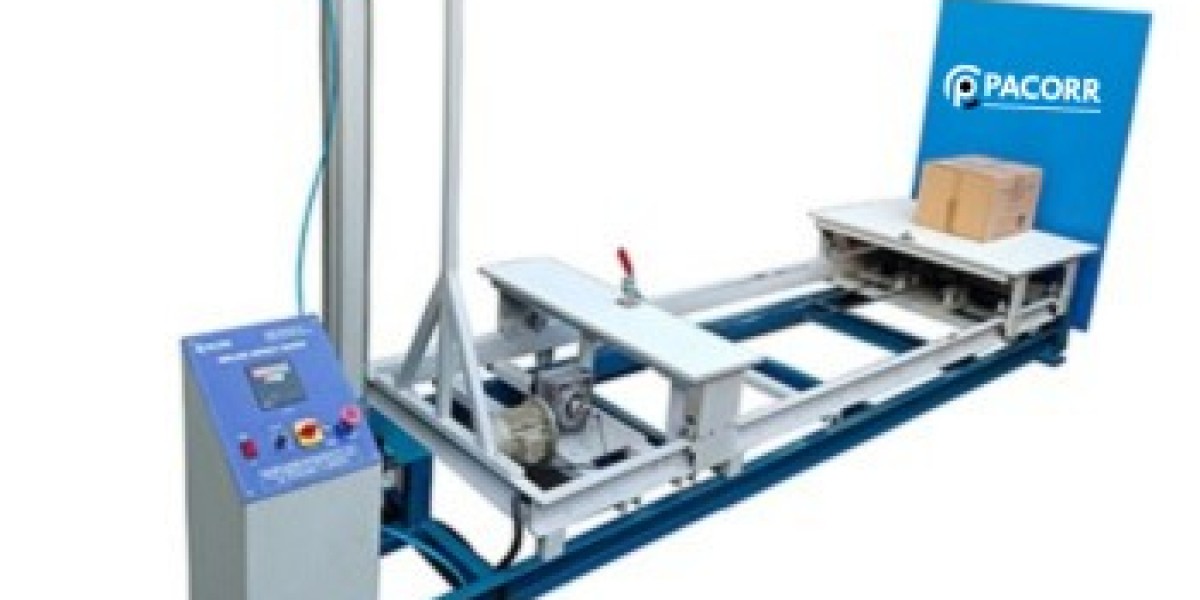What is an Inclined Impact Tester?
The Inclined Impact Tester is a specialized piece of equipment designed to assess the impact resistance of packaging materials and products. By simulating real-world conditions where products might experience impacts during handling, transportation, or storage, this tester helps manufacturers identify potential weaknesses and improve product durability.
Why is Impact Testing Important?
Impact testing is crucial for several reasons:
Product Safety: Ensures that products can withstand impacts without compromising their integrity, thereby protecting consumers.
Quality Assurance: Helps maintain consistent product quality by identifying defects or weaknesses in materials.
Regulatory Compliance: Assists manufacturers in meeting industry standards and regulatory requirements.
Cost Efficiency: Reduces the risk of product returns, recalls, and associated costs by ensuring robust packaging and product design.
How Does the Inclined Impact Tester Work?
The Inclined Impact Tester operates on a simple yet effective principle. The equipment consists of a sloped platform where the test specimen is placed. The specimen is then allowed to slide down the incline and collide with a fixed barrier at the bottom. This collision simulates the impacts that products might face during various stages of their lifecycle. The tester can measure the force of impact and observe the resulting damage, providing valuable data for analysis.
Key features of the Inclined Impact Tester include:
Adjustable Incline Angle: Allows for testing at different angles to simulate various impact conditions.
Variable Impact Speeds: Enables testing at different speeds to mimic real-world scenarios.
High Precision Sensors: Ensure accurate measurement of impact forces.
Durable Construction: Built to withstand repeated testing and provide reliable results over time.
Applications of the Inclined Impact Tester
The versatility of the Inclined Impact Tester makes it suitable for a wide range of industries and applications, including:
Packaging Industry: Evaluates the impact resistance of packaging materials such as cardboard, plastic, and metal containers. Ensures that packaging can protect products during transit.
Automotive Industry: Tests the impact resistance of components like bumpers, panels, and other critical parts.
Consumer Electronics: Assesses the durability of electronic devices and their packaging.
Food and Beverage: Ensures that bottles, cans, and other packaging can withstand impacts during distribution.
Pharmaceuticals: Tests the integrity of packaging to ensure the safety of medical products.
Benefits of Using the Inclined Impact Tester
Enhanced Product Design: Provides insights into the impact resistance of materials, leading to improved product designs.
Increased Customer Satisfaction: Ensures that products reach consumers in optimal condition, reducing the likelihood of damage during transit.
Regulatory Compliance: Helps meet industry standards and regulations, avoiding potential legal issues.
Cost Savings: Minimizes the risk of product returns and recalls, saving costs associated with damaged goods.
Reliable Data: Offers precise and consistent data for quality control and research purposes.
Choosing the Right Inclined Impact Tester
When selecting an Inclined Impact Tester, consider the following factors:
Test Capacity: Ensure the tester can handle the size and weight of your test specimens.
Accuracy: Look for testers with high-precision sensors and measurement capabilities.
Durability: Choose equipment built to withstand frequent use and provide long-term reliability.
Ease of Use: Op for user-friendly models with straightforward operation and maintenance.
By understanding the functionality and applications of the Inclined Impact Tester, manufacturers can make informed decisions and achieve higher standards of quality and safety in their products.
FAQ: Inclined Impact Tester
- What is an Inclined Impact Tester?
An Inclined Impact Tester is a device used to evaluate the impact resistance of packaging materials and products. It simulates real-world impacts that products might encounter during handling, transportation, or storage to identify potential weaknesses and improve durability.
- How does the Inclined Impact Tester work?
The tester consists of a sloped platform where the test specimen is placed. The specimen slides down the incline and collides with a fixed barrier at the bottom. This collision simulates impacts, and the tester measures the force and observes the resulting damage.
- Why is impact testing important?
Impact testing ensures product safety, maintains consistent quality, helps meet regulatory requirements, and reduces costs associated with product returns and recalls by identifying and addressing potential weaknesses in materials and designs.
- What industries can benefit from using an Inclined Impact Tester?
Industries such as packaging, automotive, consumer electronics, food and beverage, and pharmaceuticals can benefit from using an Inclined Impact Tester to ensure their products can withstand impacts and maintain integrity.
- What features should I look for in an Inclined Impact Tester?
Key features to consider include adjustable incline angles, variable impact speeds, high precision sensors, and durable construction. These features ensure accurate testing and reliable results.
- How can the Inclined Impact Tester improve product design?
By providing data on how materials and products respond to impacts, the tester helps manufacturers identify weaknesses and make informed decisions to enhance product design and durability.
- Can the Inclined Impact Tester help with regulatory compliance?
Yes, using the Inclined Impact Tester can help manufacturers meet industry standards and regulatory requirements, avoiding potential legal issues and ensuring product safety.
- How does the Inclined Impact Tester contribute to cost savings?
The tester minimizes the risk of product damage during transit, reducing the costs associated with returns, recalls, and customer dissatisfaction. It also aids in developing more durable and reliable products, lowering long-term costs.
- What is the typical testing process with an Inclined Impact Tester?
The testing process involves placing the test specimen on the inclined platform, allowing it to slide down, and measuring the impact force when it collides with the barrier. The results are then analyzed to determine the specimen's impact resistance.
- How accurate are the measurements from the Inclined Impact Tester?
Modern Inclined Impact Testers are equipped with high precision sensors that ensure accurate measurement of impact forces, providing reliable data for quality control and research.
- Can the Inclined Impact Tester handle different sizes and weights of test specimens?
Yes, most Inclined Impact Testers are designed to accommodate various sizes and weights of test specimens. However, it's essential to choose a tester that matches your specific testing requirements.
- Is the Inclined Impact Tester easy to operate?
Many Inclined Impact Testers are user-friendly, with straightforward operation and maintenance. It's advisable to select a model that meets your ease-of-use preferences and technical capabilities.
- How often should the Inclined Impact Tester be calibrated?
Regular calibration is essential to maintain the accuracy and reliability of the tester. The frequency of calibration depends on the manufacturer's recommendations and the frequency of use.
- Can the Inclined Impact Tester be used for both product and packaging testing?
Yes, the Inclined Impact Tester is versatile and can be used to test both products and their packaging, ensuring overall durability and protection during transit.
- Where can I purchase an Inclined Impact Tester?
Inclined Impact Testers are available from specialized manufacturers and suppliers of testing equipment. It's essential to choose a reputable supplier to ensure the quality and reliability of the tester.
For more information about the Inclined Impact Tester and how it can benefit your quality assurance processes, visit paccor.com.
About:
Introduction
The Inclined Impact Tester is an essential piece of equipment in the field of quality control and assurance. It is specifically designed to evaluate the impact resistance of various products and packaging materials, ensuring that they can withstand the rigors of handling, transportation, and storage. This testing apparatus simulates real-world conditions where products might experience impacts, helping manufacturers identify potential weaknesses and improve the overall durability and safety of their products.
Key Features
Adjustable Incline Angle:
The tester features an adjustable incline angle, allowing for the simulation of different impact scenarios. This flexibility helps in mimicking various real-life situations to ensure comprehensive testing.
Variable Impact Speeds:
The Inclined Impact Tester can operate at different speeds, providing a range of impact forces. This capability is crucial for testing products under various conditions, from gentle bumps to severe impacts.
High Precision Sensors:
Equipped with high-precision sensors, the tester ensures accurate measurement of the impact forces. This precision is vital for obtaining reliable data that manufacturers can use to make informed decisions about product design and material selection.
Durable Construction:
Built with robust materials, the Inclined Impact Tester is designed to withstand repeated use, ensuring long-term reliability and consistent performance in testing environments.
Working Principle
The working principle of the Inclined Impact Tester is straightforward yet highly effective. A test specimen is placed on a sloped platform. When released, the specimen slides down the incline and collides with a fixed barrier at the bottom. This collision simulates the impact conditions that products might face during their lifecycle. The tester measures the force of the impact and assesses the resulting damage, providing valuable insights into the product’s impact resistance.
Applications
The Inclined Impact Tester is versatile and applicable across various industries, including:
Packaging Industry:
Ensures that packaging materials such as cardboard, plastic, and metal containers can protect products during transit by evaluating their impact resistance.
Automotive Industry:
Tests the impact resistance of automotive components like bumpers, panels, and other critical parts to c
Consumer Electronics:
Assesses the durability of electronic devices and their packaging to ensure they can withstand impacts during shipping and handling.
Food and Beverage:
Evaluates the impact resistance of packaging for bottles, cans, and other containers to ensure product integrity during distribution.
Pharmaceuticals:
Tests the integrity of packaging for medical products to ensure they remain safe and effective during transportation and storage.
Benefits
Enhanced Product Design:
Provides insights into material and design weaknesses, allowing manufacturers to improve product durability and performance.
Increased Customer Satisfaction:
Ensures that products reach consumers in optimal condition, reducing the likelihood of damage and returns.
Regulatory Compliance:
Helps manufacturers meet industry standards and regulatory requirements, avoiding potential legal and compliance issues.
Cost Savings:
Reduces the risk of product returns and recalls, saving costs associated with damaged goods and improving overall efficiency.
Reliable Data:
Offers precise and consistent data for quality control and research, supporting informed decision-making in product development and improvement.
Conclusion
The Inclined Impact Tester is a vital tool for manufacturers dedicated to ensuring the quality and durability of their products. By accurately simulating real-world impacts, this tester helps identify potential weaknesses and enhance product designs, ultimately leading to higher customer satisfaction and reduced costs. Its versatility and reliability make it an indispensable part of quality assurance processes across various industries.
Investing in an Inclined Impact Tester is a proactive step toward achieving superior product quality and maintaining competitive advantage in today’s demanding market. For more information about the Inclined Impact Tester and how it can benefit your manufacturing processes, visit paccor.com.
The Inclined Impact Tester Testing is an invaluable tool for manufacturers committed to ensuring the quality and durability of their products. By simulating real-world impacts, this tester helps identify potential weaknesses and improve product designs, ultimately leading to enhanced customer satisfaction and reduced costs. Whether you're in the packaging, automotive, electronics, food and beverage, or pharmaceutical industry, investing in an Inclined Impact Tester can significantly benefit your quality assurance processes and overall product reliability.



